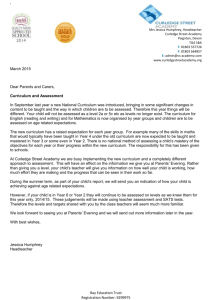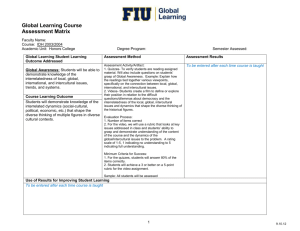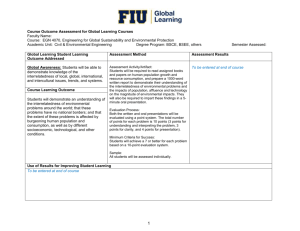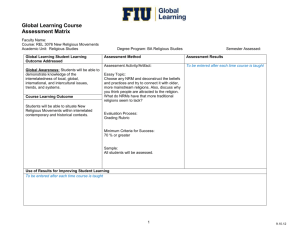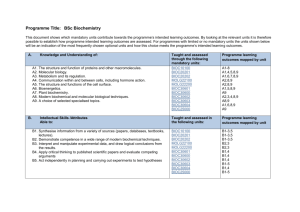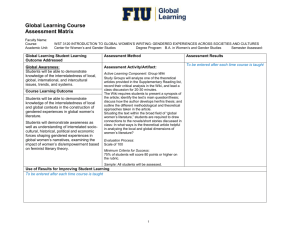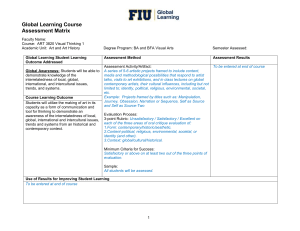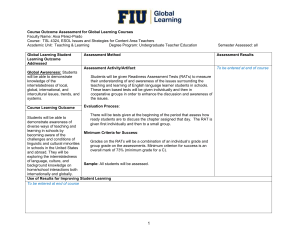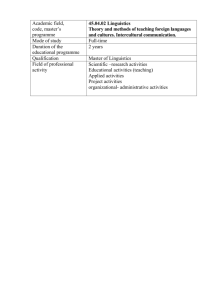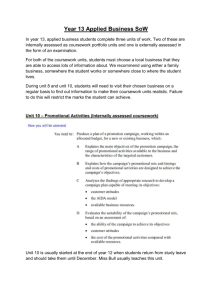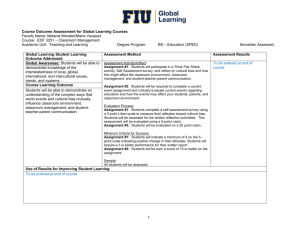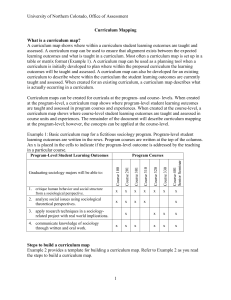Matrix - FIU Global Learning
advertisement
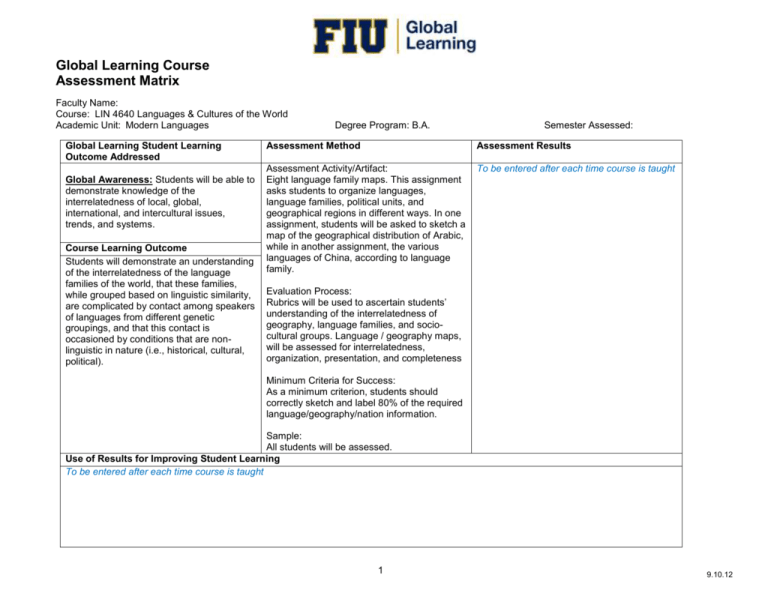
Global Learning Course Assessment Matrix Faculty Name: Course: LIN 4640 Languages & Cultures of the World Academic Unit: Modern Languages Global Learning Student Learning Outcome Addressed Global Awareness: Students will be able to demonstrate knowledge of the interrelatedness of local, global, international, and intercultural issues, trends, and systems. Course Learning Outcome Students will demonstrate an understanding of the interrelatedness of the language families of the world, that these families, while grouped based on linguistic similarity, are complicated by contact among speakers of languages from different genetic groupings, and that this contact is occasioned by conditions that are nonlinguistic in nature (i.e., historical, cultural, political). Degree Program: B.A. Semester Assessed: Assessment Method Assessment Results Assessment Activity/Artifact: Eight language family maps. This assignment asks students to organize languages, language families, political units, and geographical regions in different ways. In one assignment, students will be asked to sketch a map of the geographical distribution of Arabic, while in another assignment, the various languages of China, according to language family. To be entered after each time course is taught Evaluation Process: Rubrics will be used to ascertain students’ understanding of the interrelatedness of geography, language families, and sociocultural groups. Language / geography maps, will be assessed for interrelatedness, organization, presentation, and completeness Minimum Criteria for Success: As a minimum criterion, students should correctly sketch and label 80% of the required language/geography/nation information. Sample: All students will be assessed. Use of Results for Improving Student Learning To be entered after each time course is taught 1 9.10.12 Global Learning Course Assessment Matrix Faculty Name: Course: LIN 4640 Languages & Cultures of the World Academic Unit: Modern Languages Global Learning Student Learning Outcome Addressed Global Perspective: Students will be able to conduct a multi-perspective analysis of local, global, international, and intercultural problems. Course Learning Outcome Students will be able to conduct an analysis of a range of geo-political problems related to language (e.g. struggles for statehood, linguistic minority rights, etc.) from multiple perspectives, including the perspective of governments, linguistics, minority group leaders, NGOs, etc. Degree Program: B.A. Semester Assessed: Assessment Method Assessment Results Assessment Activity/Artifact: Short paper (5-7 pages) on a sociopolitical language issue outside of the U.S. and/or the student’s country-oforigin (e.g. language policy, language rights, language planning, geopolitical conflict, etc.). Example topics include: a history of “three-language” policy in India, regulation of Russian in Estonia, the politics of revitalization of Hawaiian, etc. To be entered after each time course is taught Evaluation Process: Papers will be graded according to the following: a. Main focus is sociopolitical; follows guidelines for paper topic choice described in syllabus : b.Thesis statement / main idea is easily identifiable, plausible, insightful, and clear. c. Clearly relates evidence about sociopolitical linguistic analysis to thesis or main idea; analysis is fresh and exciting, posing new ways of thinking about material, provides examples from examined sociopolitical situation. d. Demonstrates research on sociopolitical-linguistic situation. e. Referenced works are cited textually and in a bibliography according to the conventions of an accepted reference system. Minimum Criteria for Success: Original analysis of sociopolitical linguistic situation that considers the analyzed problem from a minimum of three perspectives, evaluating the positions, stakes, and merits of each. Sample: All students will be assessed. Use of Results for Improving Student Learning To be entered after each time course is taught 2 9.10.12 Global Learning Course Assessment Matrix Faculty Name: Course: LIN 4640 Languages & Cultures of the World Academic Unit: Modern Languages Global Learning Student Learning Outcome Addressed Global Engagement: Students will be able to demonstrate willingness to engage in local, global, international, and intercultural problem solving. Course Learning Outcome Students will demonstrate a willingness to develop critical responses to sociocultural problems related to language diversity, with an emphasis on solutions for the maintenance of immigrant languages (locally), and ethnic-minority languages (nationally and internationally). Degree Program: B.A. Semester Assessed: Assessment Method Assessment Results Assessment Activity/Artifact: Final Project: The loss of the world’s languages is accelerating at an unprecedented pace. Ethnic-minority languages spoken by relatively small populations are considered endangered by linguists, (e.g. Chulym language in Russia) but relatively robust national languages that until very recently were considered “healthy” (e.g. Swedish) are now also considered vulnerable. The conditions leading to the endangerment of world languages are related to those leading to the attrition of minority languages in the U.S. (e.g. the crossgenerational loss of Spanish in Miami). Students will be asked to work in teams to think critically about the problem of language endangerment and attrition at the local level, addressing either: a) the endangerment of a local indigenous language (e.g. Mikasuki) or b) the attrition of a minority language in Miami-Dade (e.g. Spanish, Kreyòl, etc.). Students will work in teams throughout the semester to: 1. identify a problem 2. document the problem 3. problem solve and, finally, 4. make a local intervention The heart of the assignment is meaningful engagement with problem solving strategies and the implementation of an intervention. Examples of interventions: the use of technology (e.g. smart phone apps) to promote the use of an indigenous language, a presentation at a local school to teach strategies for maintaining Kreyòl, or an FIU campus initiative, with specific strategies, for promoting the use of Spanish across the student body. Students will submit a final report that documents the selected problem and the intervention they make. To be entered after each time course is taught Evaluation Process: Assessment will be based primarily on the implementation of the intervention, but also on the quality of the report submitted. Minimum Criteria for Success: Students will, minimally, propose a manageable solution to the problem identified. Full credit requires implementation of the idea. Sample: All students will be assessed. Use of Results for Improving Student Learning To be entered after each time course is taught 3 9.10.12
